|
|
| 'Like' us on Facebook | Follow us: |
Posted on: June 13, 2016

EPISODE 09
 |
| Download |
Part 01 || Part 02 || Part 03 || Part 04 || Part 05 || Part 06 || Part 07 || Part 08
Sairam and welcome to the eighth episode of 'Satsang with a Techie'. This satsang started with an accidental meeting in a restaurant in Bengaluru between two childhood friends, Varun, a techie who lives in Bengaluru and Vivek, an alumnus of Sri Sathya Sai Institute of Higher Learning who has settled down in Prasanthi Nilayam to dedicate his life in the service of Baba. Following the chance meeting, Varun becomes somewhat curious about spirituality and agrees to come to Prasanthi for the weekend to continue his education in spirituality. During that trip Varun has His first darshan (this is set in 2009). After this, Varun and Vivek discuss many things over the next two days. Thrilled with the new paradigms that were now opening up, he comes back the following weekend. They have already spent an entire day discussing various spiritual topics. Varun and Vivek meet again the next morning and have short conversation. Now Varun is quite eager to continue their discussion. Let's join the friends. |
VARUN: Hello Vivek, I was counting the minutes, waiting to resume our dialogue!
VIVEK: Nice to hear that. Where do you want to start?
VARUN: Well, we were at the point where, after discussing the three primary constituent elements a human’s makeup, I was asking you what the purpose of the Universe was.
VIVEK: And I was asking you in return why brilliant scientists, who are able to figure out so many wonderful puzzles, are not able to solve this mystery, and literally end up at a dead end.
VARUN: Correct, and that’s where we were; why don’t you take it from there please?
VIVEK: Aren’t you forgetting the issue of rights v/s responsibilities? That’s one topic we need to wrap up.
VARUN: Oh yes, we can’t forget that, can we? I don’t know how exactly you are are going to fit that discussion in, but then, that is your problem!
VIVEK: Don’t worry, we shall deal with all those issues because everything we are discussing is sort of interconnected.
Now where exactly should I begin? Perhaps with the parable of the Good Samaritan narrated by Jesus. Remember that?
VARUN: Yes I do, and you also told me that people have two fundamentally different ways of approaching the problems of the world.
VIVEK: Not only the world Varun, but at everything; humans have two very different prisms through which they view life and everything connected with it including Creation, the existence of God, etc. One prism is based on the external world, and connected, if I might say so, to the Head.
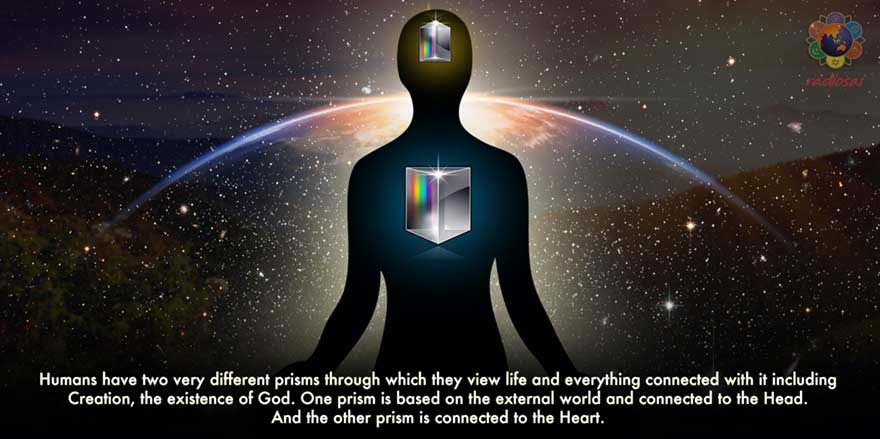 |
VARUN: You mean everything is analysed in terms what you earlier called Medha Shakti?
VIVEK: That’s right.
VARUN: And the other prism?
VIVEK: That is connected to the Heart.
VARUN: I supposed you would say that whereas the priest and the Levite viewed life through the prism called the Head, the Good Samaritan viewed life through this other prism, namely that which is connected to the Heart. Right?
VIVEK: Hundred percent.
VARUN: And if I were to take it one step further, people who are materialistic or are immersed wholly in the world and do not wish to see anything beyond Space and Time, these types would ignore this second prism – correct?
VIVEK: Absolutely!
VARUN: And I suppose that as a corollary, for those whose view of life is based on the Head, rights are important while responsibility is not. As opposed to this, those whose view of life is governed by the Heart, for such people it is responsibility is more important than just rights alone. Am I getting it OK?
VIVEK: Yes of course and Varun, I really must congratulate you for grasping all these so quickly and smartly!
VARUN: Thanks Vivek! Now there is something funny here. These scientists, at least many of them, are terrific and astonishingly brilliant. They sure must be knowing instinctively at least, especially after hearing that all these things that the philosopher guys have been saying for centuries, that there IS something out there beyond what they are talking about. Why then do they ignore so pointedly, something that definitely appears to exist, beyond the Universe?
VIVEK: Now that is a very interesting question, and the short answer to that is EGO.
VARUN: Come on, you cannot be serious! I know many scientists who are brilliant and at the same time very humble.
VIVEK: I agree that in their own professional lives many of these genius guys are indeed quite humble. However, I must clarify that when I use the word EGO, I mean it in the Vedantic sense. True, these persons are not necessarily brash, arrogant and that sort of thing. However, they basically refuse to explore beyond the realm of the seen; to put it differently, their vision of everything is bounded entirely by Space and Time.
VARUN: I cannot see anything wrong with that.
VIVEK: Well, there is a fatal flaw in this approach, and what I referred to as EGO is connected with this fatal flaw.
VARUN: What is this fatal flaw that you keep referring to?
VIVEK: A long time ago, Gandhi said: “There is an indefinable mysterious power that pervades everything. I feel it though I cannot see it.” Gandhi then goes on to identify this Omnipresent but invisible power with God who is Formless, Abstract etc. Notice he says – I FEEL this power but cannot see it.
VARUN: I am sorry but I don’t get you.
VIVEK: Look at it this way. When a person chooses to look at everything through a prism that is bounded by Space and Time, he or she does not pause to ask: “Where did this Universe come from?”
VARUN: Wait a minute! I have to correct you here because everyone now says it came from the Big Bang.
VIVEK: OK, what started off the Big Bang? Let me put it more explicitly as follows: You agree that Universe is full of matter, with billions of galaxies, each galaxy having billions of stars? That is a lot of matter. And if Prof. Einstein is correct – which of course he sure is – then all this huge amount of matter translates into a huge amount of energy. Where did all that energy come from?
If you want to withdraw money from the bank, you must first have some money in there, must you not? Or, if you want an overdraft, you must have and arrangement with the Bank Manager, must you not?
VARUN: OK; so you are saying that this energy for Creation is coming from some unseen Bank and that the Manager of that Bank is God – is that it?
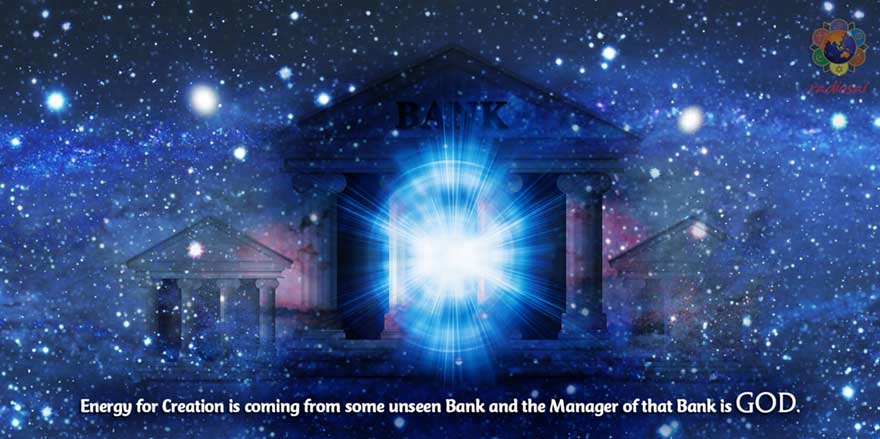 |
VIVEK: You have put it neatly and very simply.
You see the problem Varun? This discussion we had thus far reveals that there was something out there BEFORE CREATION, BEFORE THE UNIVERSE CAME INTO EXISTENCE. You cannot sweep that fact under the rug and talk as if this agency beyond Creation did not exist at all. That would be ostrich-like!
VARUN: Very well then, here are three questions for you.
• Why then do scientists who are atheists, who surely must be aware of the points you are making, not asking: Where did that initial energy deposit come from?
• Second question: Why are they ostrich-like?
• Third question: What about this EGO business?
VIVEK: Those are excellent questions Varun, and let us take them one by one. Firstly, scientists are asking the question, “Where did the initial deposit of energy coming from”.
VARUN: And what answer do they give to that puzzle?
VIVEK: I don’t know the full details, but one answer that is often given is: “That is simple! Our Universe was born from a Mother Universe that existed before ours was born! So our Mom gave us all the energy – that is all there is to it!”
I am oversimplifying of course, but in essence, the question of initial deposit is simply transferred, in a sense to a mother-and-daughter picture.
VARUN: Hey! But wait a minute!! How was the Mother born? And where did she get her initial deposit from?
VIVEK: [smiles] So you see how Prism number one merely gives us a chicken-and-the-egg problem and does not really solve anything in a philosophical sense?
VARUN: I can see that; but what is the way out?
VIVEK: Well, that exactly is where we do what the Good Samaritan did; we pick up Prism number two, which everyone is ignoring, either through ignorance or deliberately.
VARUN: That takes us to my second question about why people are ostrich-like.
VIVEK: It sure does.
VARUN: And your answer to that question is?
VIVEK: Ah, this is where we make a serious entry into the Spiritual realm!
VARUN: In what way?
VIVEK: Well, remember our earlier discussion about the human being a composite of three distinct entities?
VARUN: Are you referring to the humans being a composite of the gross body, the subtle Mind and the super subtle Atma?
VIVEK: That’s right. Now of these three entities, the Atma is the Cause; that is to say, it is the Universal Eternal entity from which everything came. It is thus a Causal entity.
VARUN: Are you saying that everything came from the Atma?
VIVEK: It is not I who am saying it; that is what Krishna declares in the Gita, adding that in fact, He is the Atma.
VARUN: So God equals Atma; is that it?
VIVEK: That’s right and God is just another name for the Atma.
Now you would notice that of these three entities that contribute to the overall human personality, two are below Creation, while one is beyond Creation.
VARUN: What exactly do you mean by that?
VIVEK: Well, it should be obvious, is it not that the gross body is made up of atoms which came into existence AFTER the Big Bang? Hence I call it below Creation.
VARUN: OK, what about the Mind, which you declare to be subtle?
VIVEK: The Mind is a most interesting entity. Like the atoms, it too is born of the Atma; and, it is very powerful. In fact, in the Gita, Krishna declares that among the senses He is the Mind, although normally we would not think of the Mind as one of the senses like the skin, the eyes, and so on.
VARUN: I guess, we could say the Mind is like the CPU of a computer, connected to the I/O devices like eyes and what have you.
VIVEK: Technically, it is the brain that might be likened to the CPU. However, from a Vedantic point of view, the Mind which is much more than the biological object called the physical brain, is the real CPU.
VARUN: Is the Mind also below Creation?
VIVEK: Yes of course.
VARUN: Why do you say so?
VIVEK: Because of two reasons. Firstly, on the basis of its usual functionality, which is to work closely with the senses which, as you know are outward looking. Secondly, above Creation, there is no room for anything other than the Atma.
VARUN: Let me get this straight. Are you saying that
1) the Mind beyond the gross and physical brain, and
2) but at the same time the Mind is below Creation, that is below Space and Time, especially when it gets strongly tied to the senses? In short, the Mind tends to focus mostly on the outside world?
VIVEK: That is right. The senses drag the Mind into the outside world where the Mind sees many, many attractions. It falls for them and gets stuck; and there start all the problems.
VARUN: There is something here that is eluding me here. The way you are putting things, it appears that the Mind has some other option; does it indeed have an alternate option?
VIVEK: Yes it sure does, and Swami explains it this way. He says the Heart is like a lock and the Mind is like a key. You turn the key one way, and Heart gets locked; you turn it the other way and the Heart gets opened.
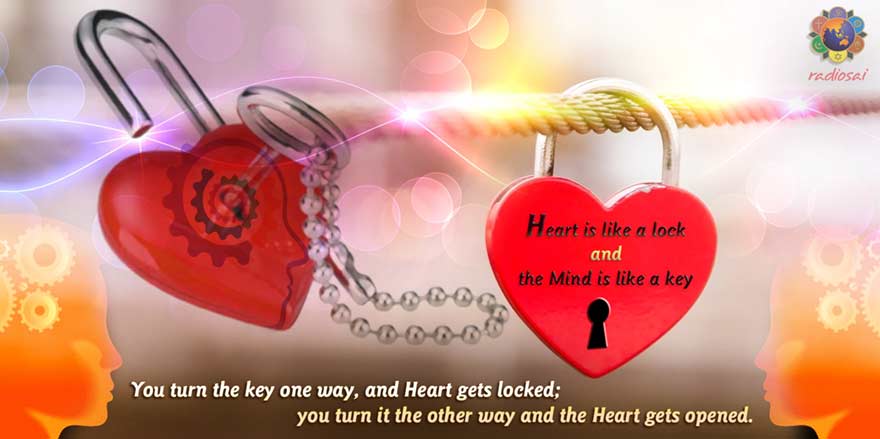 |
VARUN: If I link what you just said to the story of the Good Samaritan we discussed earlier, it would imply that in the case of the first two passers by the Heart was locked while in the case of the man from Samaria, the Heart was open; am I right?
VIVEK: [looking very happy] One hundred percent and that really is the key point.
You see Varun, it is the Mind that decides which of the three elements in us is the core of our personality. If the Mind decides it is the Mind-body complex that is the core, then the Heart gets side-lined. Such a person would be very worldly, and if the body dominates excessively, he would very much like an animal. On the other hand, if the Mind dominates, he would no doubt shine in terms of worldly achievements but driven solely by excessive ambition.
VARUN: I guess such a person might end up as a power hungry and cruel dictator or a ruthless financier, or whatever – right?
VIVEK: Exactly, and so we come back to your question about EGO. When a person identifies himself or herself excessively with the Mind-body complex, we call it and EGO-complex or EGO for short. In Sanskrit, this kind of outward-looking attitude is referred to as Dehabhimanam. In simple terms, it means strong and excessive attachment to the body.
VARUN: If I get you right, thanks to the misdirection of the Mind, a person can forget that his or her true nature is really the Atma. And I guess this is the Identity Crisis you were alluding to earlier - right?
VIVEK: You are, and this issue concerning the way the Mind behaves is an important one. That is why Swami often discusses in His Discourses the basic question: “Who am I?”
He then goes on to add: “Am I the body? No!”
“Am I the Mind? No.”
“Then who exactly am I? I am the Atma!”
In this way, Swami reiterates again and again, that though we do have a body, a Mind and the Atma, our Real Nature is that of the Atma.
That is a core point in Spirituality, and that is the first thing one has to get absolutely right, if one is to make any Spiritual progress at all.
VARUN: Vivek, if I link what you just said to the story of the Good Samaritan, then it seems to me that the person who identifies with the Atma would be compassionate and all that; am I getting it correct?
VIVEK: Absolutely. It is like being tuned to the right wavelength. Once a person is properly tuned, then life would become very different for that person.
VARUN: In a vague way, I see what you are seeing, but can you put it more explicitly?
VIVEK: Would be happy to. Let us go through all that I said once more but in a slightly different fashion, and step by step.
Let us first consolidate what we have just discussed by recalling two famous examples from mythology. Let us first consider Hiranyakashipu – you know him of course.
VARUN: Let me see; he was the father of Prahlada, the little boy who saw God everywhere. And I guess this Hiranyakashipu was supposed to be a bad guy – right?
VIVEK: You are. Now this man was very brilliant but his excessive body consciousness ultimately brought about his ruin and total destruction.
Another famous example was Ravana. By the way, are you aware of an important difference between these two bad guys?
VARUN: You tell me!
VIVEK: Both were dominated by what I called EGO or Dehabhimanam, but with one difference, which is that while Hiranyakashipu was an atheist, Ravana believed in God.
VARUN: Yet, it did not make any difference; why?
VIVEK: Ah, that is the real key point. You see, when body-consciousness takes hold and begins to dominate a person, then at critical moments it really does not matter whether or not the person believes in God. Either way, the person ends up behaving like a devil!
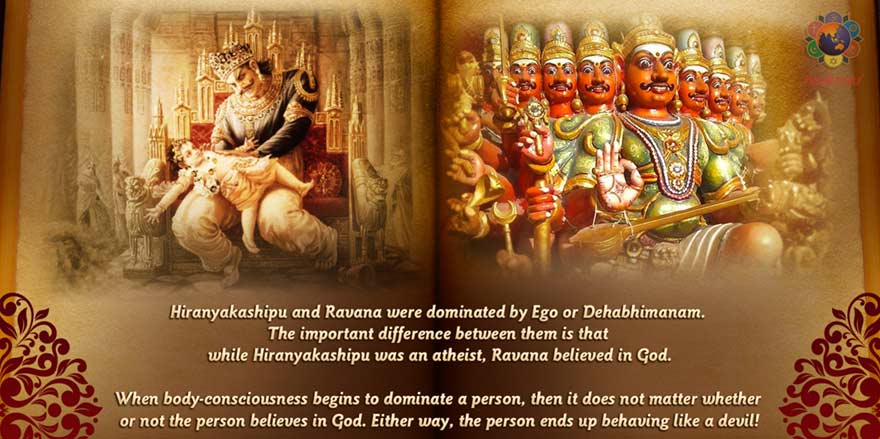 |
VARUN: So, this business of proper identification of one’s true Nature is absolutely vital, is that it?
VIVEK: That is right. In a sense, it is rather like a musician first tuning the tambura and then singing in tune with the tambura sruthi. As you are aware, the tambura is an essential part of all types of classical Indian music. It is a very simple instrument really, with just four long strings of different thicknesses stretched across a long thin body. And its job is to provide a background drone sound.
AUDIO EXAMPLE
Did you hear that?
VARUN: The sound of the tambura was rather like the chant of the OM!
VIVEK: You are absolutely right, and it is no accident I assure you!
VARUN: This sure is getting interesting. Now go ahead and tell me what the tambura sound has to do with day-to-day life and spirituality!
VIVEK: Sure will. Our Conscience is like the tambura. First of course we must tune it. Don’t jump in with a question right away! Soon I shall discuss what is meant by ‘tuning the tambura called Conscience’!
Once this tambura called Conscience is tuned, just as the musician makes every effort to remain true to the sruthi provided by the tambura, humans also must make every effort to follow the Voice of Conscience. Just listen for a minute to a musician singing and remaining tuned to the tambura.
AUDIO EXAMPLE
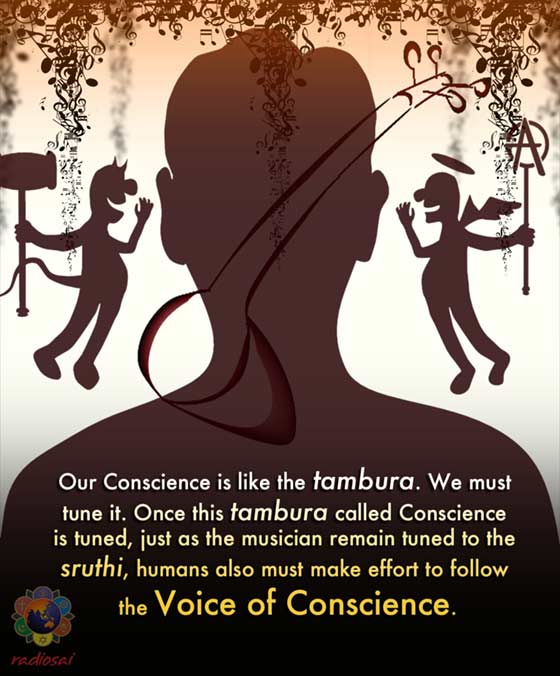 |
VIVEK: OK, did you get the point?
VARUN: In a vague sort of way perhaps, but boy, that was a heavy dose and I am going to need time to digest all that.
VIVEK: [smiles] No problem, let us do it slowly, at the pace you are comfortable with. By the way, Swami once said in a Discourse that adherence to Truth or Sathya really meant that every action of ours must always reflect the Nature of the Atma. That is another way of saying that all our actions must be rooted in Sathya, and must have the breath of Dharma, as well as the fragrance of Prema.
VARUN: Thanks. Listen, you keep bowling these bouncers in rapid succession; give me a break man, I need time to digest all this! I am a dumb techie, remember!
VIVEK: [laughs] You are not a dumb techie but my dear friend! OK, I shall take a pause and allow you instead to shoot the questions you want to ask.
VARUN: You bet I am going to ask many questions. First, you said something about the tambura inside, the Voice of Conscience and all that. In a vague way, I follow that, but since this is an important point, you need to explain it all in detail.
VIVEK: Good point. Now we all live in this world, and inevitably our senses are in constant touch with what goes on there in this big and wonderful world surrounding us. This of course is as ordained and there is nothing wrong with it.
Next, where the senses go, there the Mind usually follows. There is nothing wrong with this per se, provided the senses do not drag us where the Mind ought not to go.
VARUN: Give me an example.
VIVEK: Here is one. You are a tourist in say a rich country and you are walking along the road. You see a gambling den. Your eyes see the sign board of the gambling joint and send the signal to the brain. The brain reads and interprets the sign, and recognises the place to be a gambling joint.
VARUN: And then you feel tempted, go in, lose all your money, and soon you are in deep trouble – I guess that is what you are going to say next; right?
VIVEK: Basically, yes. The Mind has reasoning power; it is capable of very powerful logic. In this case, it is all very simple really.
The fool who walks into the trap ought to have realised, that
1) in a gambling den, most people lose heavily,
2) that he did not have much cash, and
3) if he lost his money, he is done for; he cannot pay for the hotel and would have a hard time getting out of the country. He might even end up in jail instead of returning home.
VARUN: All that is pretty obvious; why then does the fellow walk into a trap?
VIVEK: My dear friend that IS the central problem of life.
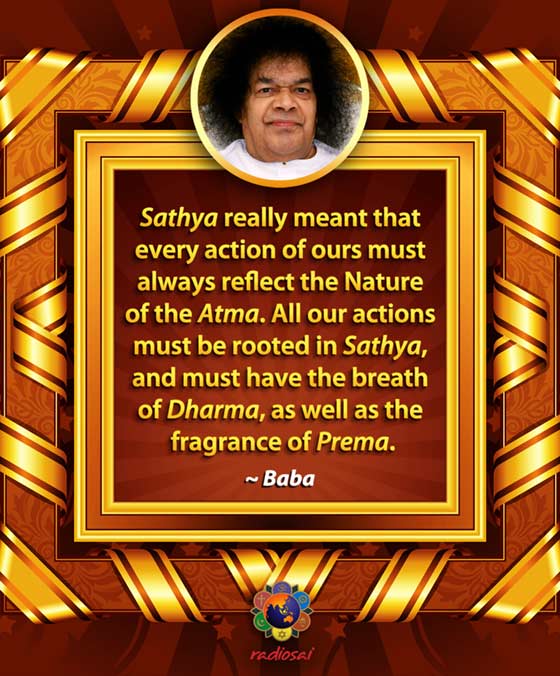 |
There are millions of examples of mistakes committed by people who have behaved foolishly earlier, ending up in disaster. And yet, day after day, other people seem to make the same mistakes. Nobody seems to learn from those who have suffered earlier!
Isn’t it funny that humans who are supposed to be so very clever can also be utterly dumb and stupid? How else can you explain this refusal to learn from the earlier experiences of millions of others who have gone ahead on this wrong path earlier?
VARUN: What you say is true; but why does that happen?
VIVEK: [smiles] That happens because a very powerful force intervenes, blinding reasoning power!
Basically, this 'blinding power' as I call it, acquires total control over the Mind and fools it by saying: “Listen buddy, those other guys were all dumb; you are not! You are very smart, and I am here to guide you! Just follow me and everything would turn out just fine!”
People then come under the spell of the magical salesman of the Devil and immediately buy a ticket to disaster - that is why!!
VARUN: You know Vivek, all that you say seems familiar. But how come even smart people can end up buying a lemon? There seems to some fatal flaw? What is it? I am dying to know!
VIVEK: That mystery sir, would have to wait for a solution till our next meeting! Till then, I leave it to you as a puzzle to crack all by yourself, that is, if you have the time as well as the inclination!
Come on, let’s go!
Radio Sai Team
| comments powered by Disqus |






